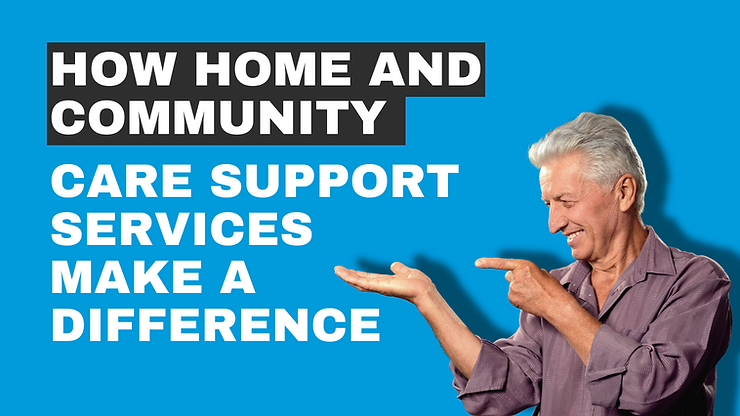Introduction
As we age, it’s not uncommon to require a little extra help and support in our daily lives. Whether due to physical limitations, chronic conditions, or simply the desire for some companionship, home and community care support services have become an invaluable resource for seniors in need of care. These services aid in various aspects, ensuring the well-being and independence of older adults. In this blog post, we will explore how home and community care support services make a difference in the lives of seniors. From personal care to household chores and social engagement, these services offer a comprehensive solution for ageing individuals. So, let’s dive in and discover the positive impact they can have!
Personal Care: Promoting Independence and Dignity
One of the primary ways home and community care support services make a difference is by providing personal care assistance. This includes help with bathing, grooming, dressing, and medication management. By having trained professionals assist with these tasks, seniors can maintain their independence and dignity. The presence of a compassionate caregiver ensures that personal care needs are met with respect and sensitivity, allowing seniors to feel comfortable and confident in their own homes.

Household Chores: Lightening the Load
Keeping up with household chores can become challenging as we age. However, home and community care support services recognize this struggle and offer assistance in maintaining a clean and organized living space. From light housekeeping to laundry and meal preparation, caregivers are there to alleviate the burden of these tasks. By taking care of these responsibilities, seniors can focus their energy on doing the things they enjoy, rather than being overwhelmed by everyday chores.
Medication Management: Ensuring Safety and Compliance
Managing multiple medications can be complex and potentially dangerous if not done correctly. Home and community care support services play a crucial role in helping seniors adhere to their prescribed medication regimes. Caregivers can provide reminders, administer medications, and monitor potential side effects. With their expertise, caregivers help ensure that seniors take their medications as prescribed, promoting both safety and optimal health outcomes.

Companionship: Combating Loneliness
Loneliness and social isolation can have a significant impact on the mental and emotional well-being of seniors. Home and community care support services recognize the importance of social interaction and companionship, especially for those living alone. Caregivers offer more than just physical assistance; they provide emotional support and companionship, engaging seniors in meaningful conversations and activities. The presence of a caregiver can brighten someone’s day, reducing feelings of loneliness and fostering a sense of belonging.
Transportation: Enhancing Mobility and Independence
Maintaining mobility and independence is crucial for a high quality of life. However, as driving may become challenging or unsafe for some seniors, accessing transportation can be a barrier to staying connected with the community. Home and community care support services bridge this gap by providing transportation assistance. Whether it’s a trip to the doctor’s office, the grocery store, or social events, caregivers can accompany seniors and ensure they remain engaged and active in their communities. This freedom to explore and remain independent significantly improves seniors’ overall well-being.

Memory Care: Specialized Support for Dementia
Dementia and other cognitive impairments present unique challenges for seniors and their caregivers. Home and community care support services recognize this and offer specialized memory care services. Caregivers trained in dementia care provide personalized support, ensuring a safe and nurturing environment for those with memory loss. From memory-based activities to assistance with daily tasks, these services alleviate the stress on family caregivers and enhance the quality of life for individuals living with dementia.
Respite Care: Supporting Family Caregivers
Caring for an ageing loved one can be rewarding, but it can also be physically and emotionally demanding. Home and community care support services offer respite care, providing temporary relief to family caregivers. By allowing caregivers to take much-needed breaks, respite care ensures they can recharge and avoid burnout. This support ultimately benefits both the caregiver and the care recipient, fostering a healthier and more sustainable caregiving dynamic.

Conclusion
Home and community care support services truly make a difference in the lives of seniors in need of care. From personal care assistance to household chores, medication management, companionship, transportation, memory care, and respite care, these services provide a holistic solution to meet the unique needs of aging individuals. By employing trained professionals who prioritize dignity, independence, and social engagement, these services help seniors maintain their quality of life and age gracefully. If you or a loved one are in need of care, consider exploring the wide range of home and community care support services available and embrace the positive impact they can bring. Remember, no one should face the challenges of ageing alone when support and assistance are just a call away.
Let us help you live your best life – at home through ProCare Health Team


